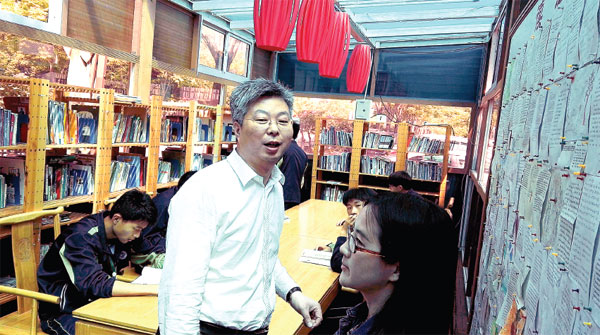A book bar that serves knowledge
Free books, coffee and tea - there's plenty to drink in, read about and do at Xiangshan
It doesn't cost money to borrow from Xiangshan Book Bar.
But there is a price to pay.
Patrons must pen reviews of titles they take upon returning them.
Over 100 of these handwritten analyses are posted on two bulletin boards and rotate on a monthly basis.
Xiangshan is open 24/7. The last patrons to leave at any given time are asked to close the door but not lock it. Actually, there is no lock.
Guests who've visited at least three times sip free coffee and tea from mugs labeled with their names.
Raised letters on the wall next to the drinks counter proclaim: "We serve you the first time. You serve yourself your second time. You serve others the third time."
These are among the creative concepts wired into the book bar's neural circuitry by its creator, 41-year-old entrepreneur Ji Feng.
Ji's brainchild hails from his exaltation of education via the printed word.
The businessman cultivated a craving for reading as a child born to a poor family in Jiangsu province's Yancheng city's outer orbit.
"There weren't many places to borrow books in the countryside."
After arriving in Jiangsu's Jiangyin city in 1996, he spent his free time in Xinhua Bookstore, where he met his wife two years later.
His life's love of reading introduced him to the other love of his life - a reader.
One who marked a new chapter in his story, starting with "I do".
"This isn't a business," Ji explains.
"It's a passion."
Ji required the 20 employees of the company he started in Jiangyin in 2004 to spend 100 yuan ($15) on books per month in the enterprise's early days. The business refunded receipts.
Workers hosted talks about what they'd read.
So many people started coming to the book bar after its 2011 founding that it disrupted his business' operations.
Ji moved his company. Not Xiangshan.
"We loved reading here," he says.
"We wanted a large reading room."
Ji donates most of the roughly 1 million yuan it costs to keep the volunteer-run bar going. Jiangyin's government has contributed close to 200,000 yuan annually for the past two years.
Xiangshan otherwise accepts books and materials but not money, Ji says.
Donated titles have increased from 10,000 to 50,000. The bar has also opened two other branches in the city.
Over 3,400 volumes at its flagship location chronicle Jiangyin's history.
"This isn't a typical charity. It's cultural," he says.
Xiangshan offers literary leisure beyond books.
Visitors massage inked brushes into paper to perfect their penmanship in the calligraphy room. They pluck guqin (seven-string Chinese zithers) and tap piano keys in the music room.
A scheduling board near the entrance details a roster of lessons, lectures and activities.
Uniformed students clack Chinese chess pieces across game boards that are perched atop tables outside the entrance, while spectating classmates hovering over them huddle in to commentate on strategies.
There's no luck. The game is pure logic.
Strategy uncompromised by chance.
So are the go rounds played inside.
Migrants' children can stay in the book bar from 8 am to 5 pm.
They even nap there.
The lessons learned from the book bar are literally written on the wall.
An Oliver Twist reviewer around the same age as the classic's orphan protagonist handwrote: "He's a person of great perseverance and principle, and has an open mind. Although his birth seems to be a mistake because he doesn't have parents, he can maintain his pure personality, even while struggling in darkness."
The student then professes a newfound appreciation of his social privilege and familial affections.
That's a narrative derived from Xiangshan that's worth examining.
erik_nilsson@chinadaily.com.cn
|
Ji Feng, founder of Xiangshan Book Bar, says it's not business but a passion. photos by ed zhang / China Daily |



















